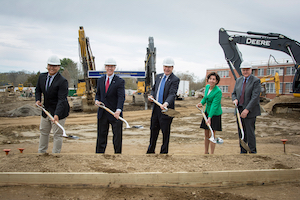The trade body for the plastics industry has held last-minute meetings with government officials as part of a lobbying effort to water down a tax on single-use plastics, internal documents have revealed.
Members of the British Plastics Federation (BPF) met Treasury staff this week, the documents state, in their fight to persuade the government to row back on a key aspect of the policy to tackle plastic pollution.
The chancellor, Philip Hammond, announced a tax on plastic packaging with less than 30% recycled content from 2022 as a key strategy in the budget, with the aim of making the UK “a world leader in tackling the scourge of plastic littering our planet and our oceans”.
The trade body’s research forecasted that a plastics tax would increase the proportion of packaging using more than 30% recycled plastic from 25% in 2017 to 75% in 2022.
But the documents obtained by Greenpeace and shared with the Guardian showed the BPF is concerned about the tax’s impact on the packaging industry’s size and turnover, which it said could cause the sector to shrink by 45% as manufacturers turn to other materials.
Its lobbying battle plans contained in the documents showed the BPF used the meeting with officials on Wednesday to push for the tax to be either dropped, watered down, supplanted by another policy or delayed.
The BPF has more than 400 members, which are all involved in UK packaging businesses and represent 75% of the industry.
Before its meeting with the Treasury, the BPF put out an urgent call for members of the packaging industry to submit case studies to show unintended consequences of the tax.
The body also asked for stories of packaging manufacturers moving out of the UK as a result of the tax plans. It argued that the industry in recycled plastic in the UK is not big enough to supply the material needed to cater for the greater demand for recycled packaging.
The BPF commissioned consultants Ernst & Young to produce its response to the tax. The analysis said its options were:
• Marshall data/evidence to support the “do nothing approach”.
• Seek to mitigate the current proposal with lower rates and exemptions.
• Seek to supplant the current proposal with an alternative.
While lobbying behind closed doors to water down the tax, the BPF has made public commitments to join the fight against plastic waste, publicly supporting a much-heralded industry agreement, the Plastics Pact, last year, which aims to introduce an average of 30% recycled content for plastic packaging by 2025.
Plastic packaging accounts for 44% of plastic used in the UK but 67% of plastic waste. More than 2m tonnes of plastic packaging is used each year, mostly made from virgin rather than recycled plastic.
The tax is part of a four-pronged strategy to improve recycling rates, cut plastic pollution and ensure local authorities are fully funded for their collections. This includes a deposit return scheme, forcing producers to pay the net cost of recycling collections and standardising recycling collections.
The BPF plans to submit its formal response to the tax on 12 May after the meetings with officials.
Simon Ellin of the Recycling Association said the BPF’s opposition to the tax smacked of protectionism. He said the tax would build the UK’s plastic recycling industry to meet the new demand. “The government have very much realised that … if you create the demand [for recycled plastic] you create the supply,” he said. “The long-term picture we can’t get away from is you will have a far, far healthier industry because of it.”
The BPF said in a statement there were “numerous technical challenges to introducing 30% recycled content”.
It continued: “In certain cases, including recycled content can result in using more plastic, not less. In some cases, increasing recycled content could make a product extremely difficult to recycle at the end of its life.”
It also said it was providing detailed information to the government to “ensure the best outcome for the environment”.
Separately, the British Retail Consortium is pushing back against the introduction of the deposit return scheme for plastic bottles, glass and cans. Last year, the government committed to a scheme and the decision on which type of deposit return scheme is adopted will be made after a consultation ends on Monday.
The consortium said a deposit scheme should not be set up before new measures had come into force that would make producers and retailers pay for the cost of recycling collections. At that point there could be an assessment of whether a deposit scheme was needed “to plug any remaining gaps”, it said.
But the Campaign to Protect Rural England, which revealed this week that global sales of drinks containers reached 1.9tn, said a robust deposit return scheme for plastic, glass and aluminium drinks containers must be adopted by the government.
Samantha Harding, the campaign’s litter programme director, said: ‘Only by introducing an ‘all-in’ deposit return system – that includes every single drinks can, bottle and carton of all sizes and materials – are we going to effectively tackle the crisis and bring about the clean planet that we so desperately need.”
References : https://www.theguardian.com/environment/2019/may/10/plastics-lobby-group-pushed-treasury-to-ease-back-on-tax-reform








